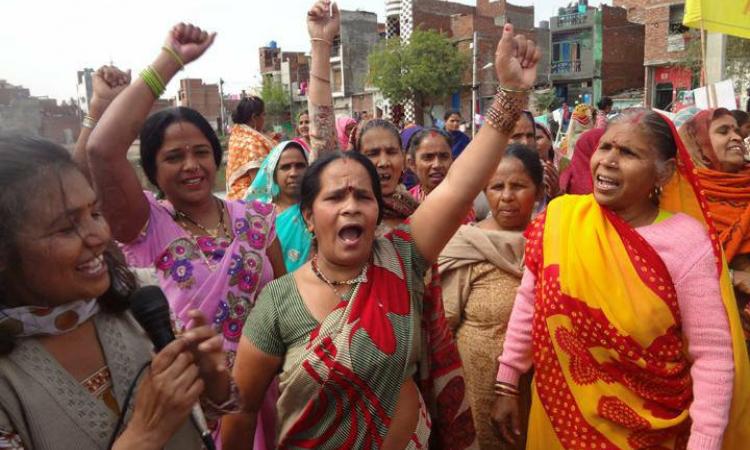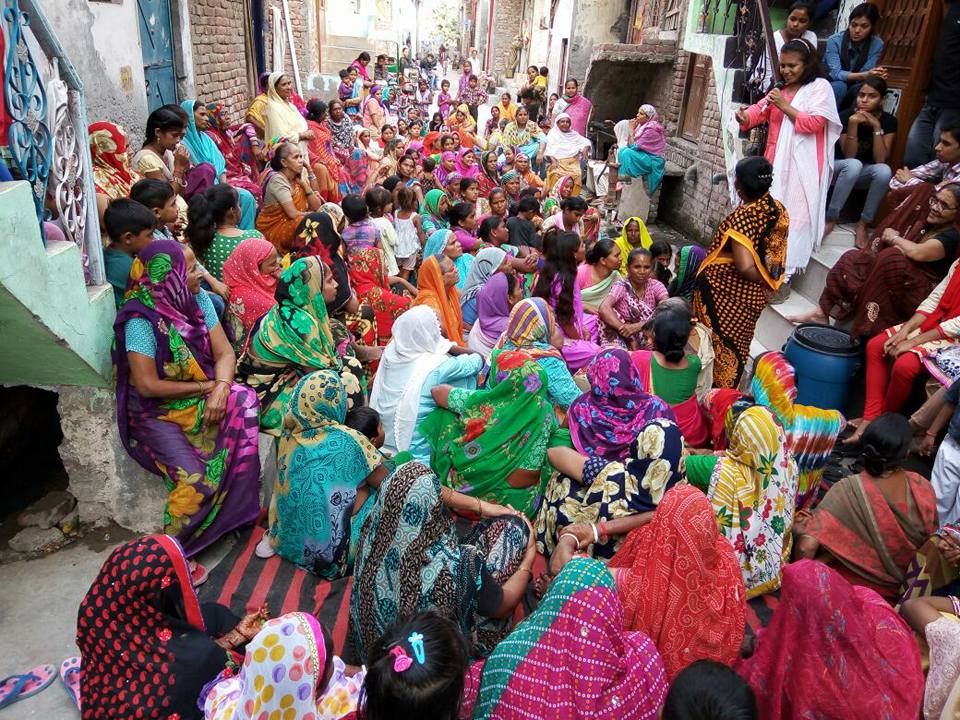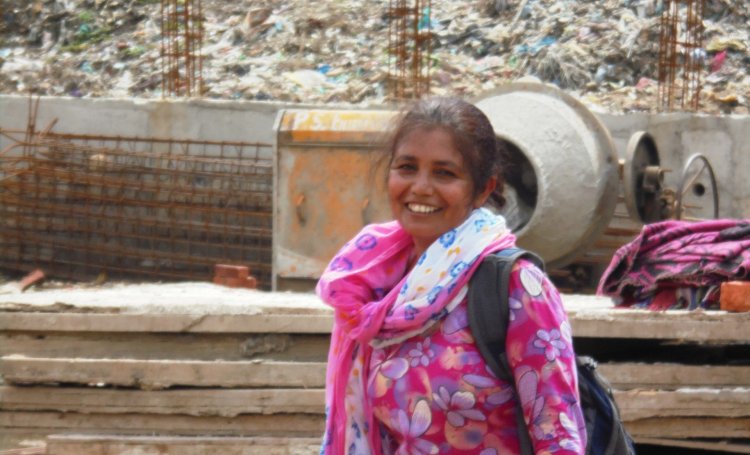
With the Right to Information (RTI) Act coming into force in the year 2005, the country saw many RTI activists making the most of it to demand the rights and entitlements of the people from the government. Pushpa, warmly known as Pushpa RTI, is one of them. In 2003, she set up the Bhalaswa Lok Shakti Manch, a citizens’ group working on the outskirts of north-west Delhi to promote transparency and accountability in local governance. Bhalaswa mostly has slum dwellers working in the informal sector. They were forcibly evicted from Gautampuri in the Yamuna riverbank when it was being “cleaned up” and were relocated to the Bhalaswa resettlement colony. A swampy land, the colony was next to an urban dump where the groundwater gets poisoned from the toxic elements from the dump leaching into the ground.
Pushpa was working with these slum dwellers in educating them and also in raising awareness on various subjects even before they moved to Bhalaswa. At Bhalaswa, she felt the need to move beyond her usual activities and inspire people to take action against corruption and complete government apathy against their situation. The initial response from the community, however, came as a surprise. They were new to the idea of taking up public action against corruption. "They were a bit annoyed with the corner meetings conducted by the manch. All my efforts to engage with them fell on deaf ears. In a little while, some of the women began opening up to me. They narrated their day to day travails regarding the lack of basic services such as running water and electricity. They also opened up about the problems they were facing on getting possession of the plots they had been allotted,” says Pushpa.
Claiming their right to food supplies
Pushpa was involved in bringing the RTI Act to force. Once the Act was passed, she taught the people of Bhalaswa to turn to RTI for transparency of the bureaucracy so the funds meant for citizens are not siphoned off by the officials. The manch also began a children’s library in Bhalaswa which is to act as a place where the community got together to discuss matters of concern to them. “Soon this became a social movement. People began to use the RTI, asking for information and demanding their entitlement. First, they tried to improve the functioning of the ration shops that were corruption ridden,” says Pushpa. They conducted a study of the public distribution system of the area and demanded the shopkeepers disclose the records of the fair price shops like the stock and sale registers. The shopkeepers were questioned as to why they were not getting their share of ration. “The manch started holding dialogues with the food and civil supplies department and put together information to let them know where we're being let down. RTI applications were also filed in the food supply department,” she says.

This was not easy. Looking for information, they were dismayed at the way officials intimidated and mocked at them. Yet, the manch encouraged the local women to persist. As a result, over 300 RTI applications were filed. “The appellate process of the Central Information Commission was resorted to whenever the RTI response was inadequate. On one occasion, the Central Information Commission sent for top officials. This was related to the fund allocation for roads. The PWD had no option but to take up the work on a priority basis,” says Pushpa.
The manch had also approached Public Grievances Commission of Delhi regarding the situation of water in the area. Delhi Jal Board (DJB), the Delhi Urban Shelter Improvement Board (DUSIB) and the Municipal Corporation of Delhi (MCD) are the respondents in this case. “The manch resorts to these only after exhausting all department channels. We maintain proper records of all our applications and complaints. Also, we keep an eye on the utilisation of Local Area Development funds,” she says.
Dealing with the problem of landfill
The Bhalaswa landfill, one of the three main trash pile sites in the area, receives 2,200 tonnes of waste per day and has grown to a height of 41 m. This landfill was to be covered and the area converted to a park before the Commonwealth Games of 2012. “The landfill is adjacent to the resettlement colony where the displaced were resettled in 2002 under the pretext of beautification of the city. As with most resettlement colonies, their living environment was anything but good. The people were told that the landfill will one day be a park but all the garbage with its foul smell stays put over there,” says Pushpa. The landfill, which was supposed to be shut down in 2010 is contaminating the groundwater and the areas around it. Pushpa’s conviction that information lay at the root of bringing about real change led her to encourage the manch to follow up with the Municipal Corporation of Delhi which publicly owns and manages the dump. The manch also turned to the Delhi Urban Shelter Improvement Board (DUSIB), which turned a blind eye to the risks to human health from the landfill. The landfill, which has not been designed as per standards, adjoins the Bhalaswa lake that is getting contaminated. The manch keeps on highlighting the menace of landfill by approaching the elected representatives from time to time through meetings or submitting petitions.
Attempts are underway to create a waste management facility that could combust waste to produce electricity from the dump to be sold to businesses and municipalities. These alternative waste treatment processes, recognised as toxic activities by the Kyoto Protocol, are being pushed through in the pretext of reducing methane emissions. The manch has been opposing this as a part of the struggle of Bhalaswa residents for clean water.
Claiming the right to water and sanitation

The vigilant citizenry built by the Lok Shakti Manch based on the RTI broke a new ground by using the Act for claiming the right of the urban poor to water and sanitation. Bhalaswa was faced with acute water problem even when it received water from the DJB’s piped water supply, hand pumps, borewells (both DJB and private borewells), as well as tankers. Yet, there is no regular provisioning of clean drinking water in the colony. The number of public stand posts for drinking water was inadequate and tankers were irregular. Due to the lack of piped water supply, people were often forced to drink groundwater which was unfit for human consumption.
A signature campaign was initiated by the manch and a complaint lodged with the DJB which works with the Delhi Development Authority (DDA). Citizens succeeded after a lot of struggle in bringing tanker water supply to the area. The manch is now fighting on the issue of leachate in groundwater which is a threat to human health.
Pushpa has also been questioning the installation of water ATMs in Delhi. She wonders if the water ATMs are able to provide safe and clean drinking water to the poor at a low cost. Recently in Delhi, several issues of accountability and violations of the DJB Act, 1988 related to the selection of the companies responsible for installing water ATMs were raised. Pushpa had in 2014-15 sought information from the DJB about the progress on the installation of water ATMs in Delhi. The response indicated that the people living in resettlement colonies were opposed to the concept of ATMs and wanted household water connections because they had both drinking and domestic water needs. Clearly, water ATMs were unable to cater to those needs.
Not just this, the manch is also fighting for the safe disposal of a large amount of waste from the households and the street that is being strewn around the colony which pose a threat to public health. The kabadiwala (waste collector) are compelled to sift through these urban dumps to earn their living in severely dirty, often dangerous conditions.
Intimidations and threats continue from influential people. Despite that, Pushpa continues with her work as usual. With information as the keystone, Pushpa, through the Bhalaswa Lok Shakti Manch, has been giving power to the community to demand what is rightfully theirs and to plug the gaps in transparency and accountability.